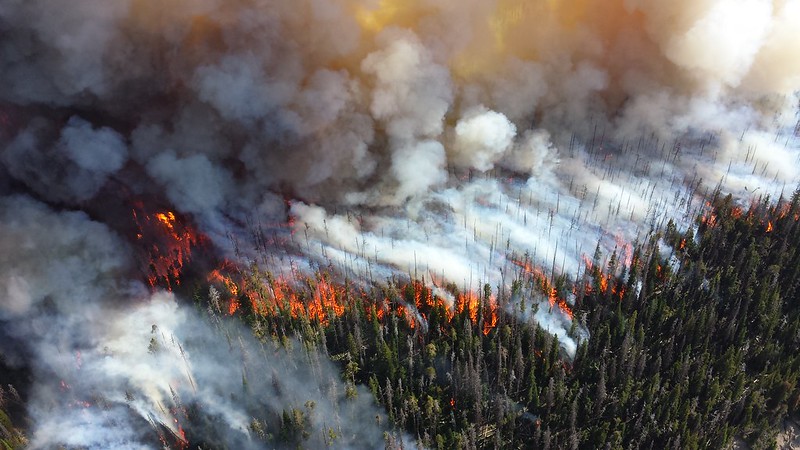“I don’t think science knows.”
Though not surprised at these words by Donald Trump, I’m outraged. We’ve seen how ever-present Trump’s climate denialism has been throughout his entire presidency, but to say this in the face of ravaging wildfires in the West?
What struck me most about Trump’s comments, though, wasn’t how it was yet another example of climate denialism in the midst of a climate emergency. I was struck by the similarity to his insistence that the coronavirus is going to disappear, and the pandemic will somehow end on its own. Continued community spread, a daily death rate stuck at a horrifying level, and the 200,000 Americans already lost to this pandemic have not moved the President off this line.
In both cases, Trump is not only willfully denying the science, but he’s also demonstrating a complete lack of empathy for the people facing the impacts already happening. This type of denialism does not stem from ignorance. There is no shortage of information and evidence on either the COVID-19 pandemic or climate change. In fact, in both cases the Trump administration has intentionally attempted to confuse the story and support misinformation and disinformation.
This denialism is purposeful, which certainly tracks with reporters occasionally catching Trump in a moment of honesty. It is based on an intention to ensure the government does not act. Because once the problem and the need are acknowledged, it would be irrational for a government not to act. Why wouldn’t a government want to protect its citizens from a virus? Or take action to prevent climate change driving worsening droughts, flooding, and wildfires, with impacts only getting worse as inaction continues? Trump’s denialism in both cases is an intentional act meant to not only ensure inaction but to also make it clear this is not what he sees the government is for.
But what is the purpose of the government if not to ensure people’s basic rights? Doesn’t that include a right to health and a right to clean air?
The climate crisis is here, and it is already hurting people in the U.S. and around the world.
Climate change is of course not the same as the weather or even individual storms, but they are certainly interconnected. Climate change makes “natural” disasters like hurricanes and wildfires more frequent and more intense than they would be otherwise. This is why we see so many “hundred year” weather events happening every year.
The National Weather Service has run out of names for tropical storms and hurricanes for the second time since 1950 – and there are a lot of names. In the last few months alone, the U.S. has suffered through four disasters costing over a billion dollars each: the derecho in the Midwest, Hurricanes Isaias and Laura, and now the California wildfires. Just this month Hurricane Sally inundated Alabama and Florida, causing as much as $10 billion in damages, leaving more than half a million people without power.
Climate change impacts have resulted in dryer springs and falls for the West, which has lengthened wildfire season. The extreme heat, driven by climate change, has further dried out the area, making fires bigger and hotter. These conditions create heat domes that often trigger dry lightning storms, which start many of the fires. So while wildfire season existed before these climate impacts, climate change is making things much, much worse.
Parallel crises
The U.S. is not the only country facing serious forest fire issues. For the past two years, fires have blazed across the Amazon and the neighboring savannah region of the Cerrado, two of the most biodiverse and precious ecosystems on the planet. The Amazon is called “the lungs of the earth,” and the Cerrado is considered to be “the mother of rivers” in Brazil. These ecosystems are central to the world for their ability to store carbon, and they are also home to many communities.
Both regions are major targets for agribusiness, cattle ranching, and mining. These companies grab land and set supposed “wild” fires in order to clear it. The situation is only getting worse as international investors have put big money into Brazilian farmland, encouraging more deforestation. This is a disaster for the climate and for the communities being forced off their land in the Cerrado. Stopping fires in a global context means reining in these industries and the financial companies behind them, in addition to responding swiftly to climate change.
Understanding the urgency of climate change means pushing for a just transition
2020 has been hard for many of us. It seems like every other day there is a breaking news story that in any other year would have dominated headlines for weeks. With all the noise, it’s hard to keep track of all the threads of what is really impacting people’s lives.
But the hurricanes hammering the East Coast are deeply connected to the wildfires choking the West. The chaos that frontline communities are facing, whether from COVID-19 or severe floods, is intertwined. And climate denialism isn’t a simple policy disagreement. It’s an intentional blow to effective governance, masked as a denial of a problem that is already costing lives.
What we need are government leaders who understand the urgency of climate change and are going to do something about it. ActionAid stands with the communities and activists demanding a Green New Deal that not only drives the necessary climate action and begins a just transition to a renewable future, but that also holds the government accountable to upholding people’s basic rights.



